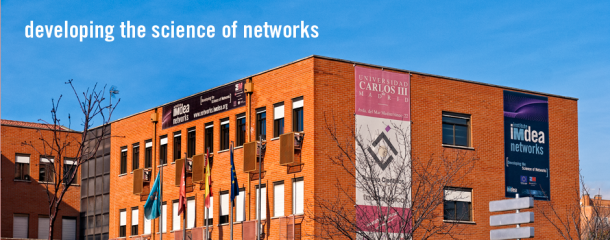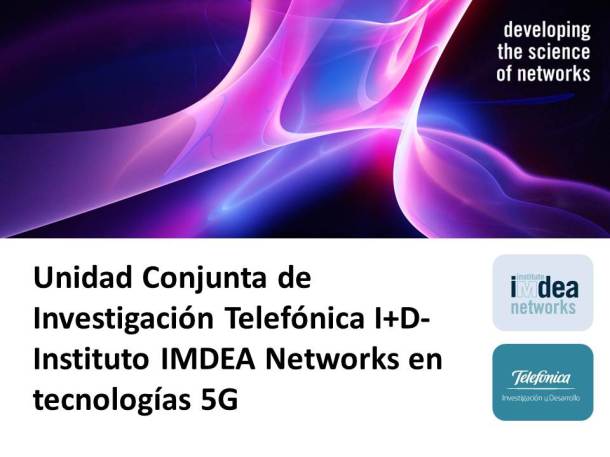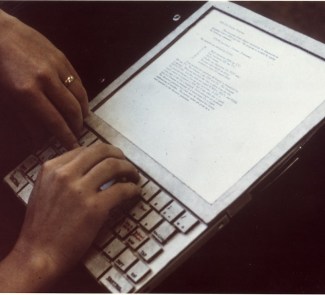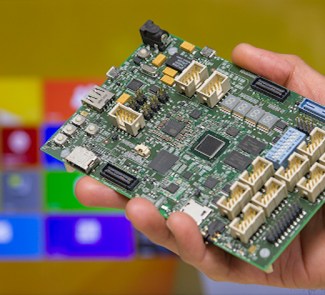Telefónica I+D and IMDEA Networks Institute create a Joint Research Unit (JRU) for 5G technologies and future networks
Telefónica I+D and IMDEA Networks Institute recently announced the creation of a Joint Research Unit (JRU), in order to provide a joint operating framework to support scientific activities of mutual interest. The Joint Research Unit will bring together a multi-disciplinary team of specialists from both organisations that will be ready to collaborate on R&D projects with outside financing.
The work of this unit will be directed by researchers from Telefónica I+D (Diego R. López and Pedro Aranda Gutiérrez) and IMDEA Networks (Arturo Azcorra, Joerg Widmer and Albert Banchs), and will focus on catalysts for next-generation networks. Some of the work areas that are being considered are the flexible functional division, optimisation of joint handovers, 60 GHz wireless networks, network operating systems, secure virtual computing, and energy-efficient networks.

One of the initial goals is to advance in joint research in 5G technologies
Although the framework of the JRU is broader and is intended to cover future network technologies, one of its primary objectives is to advance in joint research of 5G technologies. For this reason the collaboration will initially take the shape of the Advanced 5G Network Infrastructure for Future Internet Public-Private Partnership (5G PPP), promoted by the European Commission as part of the Horizon 2020 programme.
The development of the paradigm of a new generation of network infrastructure has become a point of reference in global competition for technological leadership. Over the next seven years, this public-private alliance will share know-how and skills to face the challenge of creating a model for the new technology and the standards that will have to define the networks of the future.
The purpose of this work is to provide solutions, architectures, technologies, and standards to create infrastructure for Information and Communications Technologies (ICT) and smart communications networks that are ubiquitous, robust, flexible, interoperable, and profitable.
The future 5G network will provide advances such as wireless area connection 1,000 times faster than current speeds for 7 billion people and 7 trillion objects, with an energy savings of 90% in each service provided, the reduction of the average service creation cycle from 90 days to 90 minutes and the creation of a secure and reliable Internet, with zero non-operability perceived by end users.

Both Telefónica I+D and IMDEA are firmly involved in the activities for the innovation of next-generation networks, and in fact, both are part of the 5G Infrastructure Association, which includes participation by 36 key European institutions from the industry, as well as research institutions and SMEs. This Association has signed an agreement with the European Commission to coordinate the development of the 5G PPP mentioned earlier.
Leader in the proposals of the European Commission’s 5G Network Infrastructure programme
It’s important to note that the company has been a part of the executive board of the European 5G PPP since it was established. Diego R. López, head of technological exploration at the Directorate for networks at Telefónica I+D-Global CTO, is its representative in the executive organs of the programme, with activities slated to start in 2015.
As a member of the executive committee, the company can contribute its vision for the programme, help define the European Commission’s strategy in future calls for projects, and in short, to assist in the designing of the infrastructure of the future network.
The European Commission has directed significant efforts on this programme, which has a budget of 4.2 billion euros, in order to restore Europe to position as a leader in network technology, and specifically in mobile technologies.
The 5G Network Infrastructure PPP was launched in December 2013 as part of Horizon 2020, an EU research programme with a total budget of 6.2 million euros. The alliance between the European Commission and the private sector is vital to the programme’s success.









